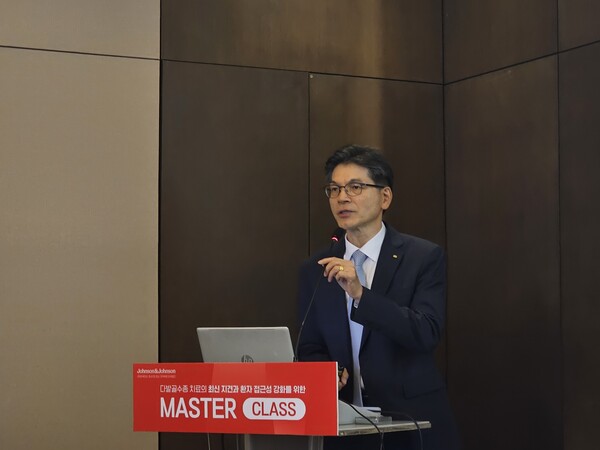Multiple myeloma survival rates in Korea are falling behind those of other developed nations, largely due to delayed insurance coverage for new treatments, according to a medical expert.
The gap in survival rates is estimated to be more than 10 percentage points compared to leading countries.

Speaking at Johnson & Johnson's Multiple Myeloma Master Class held at The Plaza Hotel on Monday, Professor Min Chang-ki of the Catholic University of Korea School of Medicine Seoul St. Mary's Catholic Hematology Hospital highlighted that while breakthrough medications for initial multiple myeloma treatment are available, delayed health insurance coverage has contributed to lower survival rates.
According to Professor Min, multiple myeloma patients in Germany and the U.S. between 2016 and 2020 showed survival rates of 62 percent and 61 percent respectively, while that of Korea remained at 51 percent.
Access to treatment
The disparity primarily stems from accessibility issues. Unlike other blood cancers, multiple myeloma is characterized by repeated relapses, with each recurrence resulting in reduced drug response rates and worsening patient prognosis.
Global treatment guidelines recommend monoclonal antibody combination therapy as first- and second-line treatments. For patients eligible for hematopoietic stem cell transplantation, the recommended first-line treatment is DVTd (Daratumumab, Bortezomib, Thalidomide, and Dexamethasone), followed by either DVd (Daratumumab, Bortezomib, and Dexamethasone) or DKd (Daratumumab, Kyprolis, and Dexamethasone) as second-line treatments.
However, in Korea, daratumumab is currently only covered by insurance as a fourth-line monotherapy treatment. While it has recently passed the Drug Benefits Committee for first-line DVTd therapy and awaits price negotiations, second-line treatment coverage still requires additional committee approval.
During the conference, Professor Min noted significant historical improvements in multiple myeloma treatment.
"When hematopoietic stem cell transplantation was first introduced in the 1990s, survival rates increased by 10-15 percent,” Min said. “Similarly, when proteasome inhibitors like Bortezomib emerged, patient survival rates improved by another 10-15 percent."
The need for early intervention is particularly crucial, as treatment effectiveness diminishes with each relapse. Data shows that while 95 percent of patients receive first-line treatment, only 15 percent reach fourth-line treatment, and merely 1 percent receive fifth-line treatment.
Recent developments in new drugs show promise. Tecvayli (ingredient: teclistamab) has demonstrated a 63 percent objective response rate in patients who had failed third-line or later treatments, with 46.1 percent of patients achieving complete remission during a 30.4-month follow-up period.
"We need to prevent patients from reaching third or fourth-line relapses," Professor Min said. "The continuous development of treatment alternatives and improved accessibility is crucial for better patient outcomes."
The expert concluded that to improve survival rates and align with global standards, Korea needs to guarantee national health insurance coverage for effective treatments, particularly in early-stage therapy where they can make the most significant impact.

